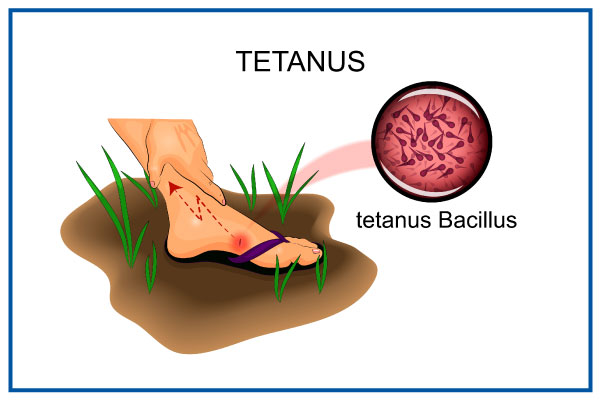General causes and symptoms of Tetanus you must know.
The dangerous infection known as tetanus, commonly known as lockjaw, is brought on by Clostridium tetani. This bacteria creates a toxin that damages the brain and neurological system and causes muscle stiffness. The neurotoxic produced when Clostridium tetani spores enter a wound prevents nerves from controlling muscular action.
The infection can ultimately be fatal and result in severe muscle spasms, significant breathing problems, and other symptoms. Tetanus therapy is available, however its efficacy varies. Getting the immunisation is the best method to prevent tetanus.
What is Tetanus?
A dangerous bacterial infection called tetanus damages the neurological system and causes the muscles all over the body to contract. Because the illness frequently produces muscle contractions in the jaw and neck, it is also known as lockjaw. It might later, nevertheless, spread to other bodily regions.

Without treatment, tetanus infection can be fatal. The Centers for Disease Control and Prevention (CDC) estimate that 10 to 20 percent of tetanus infections result in death.
Tetanus is a serious medical issue that requires prompt hospital care. Fortunately, tetanus can be avoided by using a vaccine. This vaccination does not, however, last indefinitely. To maintain immunity, booster vaccinations for tetanus are required every ten years.
Tetanus is uncommon in the United States thanks to the vaccine’s widespread accessibility. In other nations without robust immunisation regimens, it is more prevalent.
Symptoms of Tetanus
The incubation period, or the amount of time between an infection and the onset of symptoms, is typically 10 days. The incubation phase may last three to twenty one days.
Tetanus is most frequently known as generalised tetanus. Over the course of two weeks, signs and symptoms steadily intensify after a modest start. Usually, they begin at the jaw and work their way down the body.
Generalized tetanus symptoms and signs include:
- Muscle rigidity (muscle rigidity) and painful muscle spasms in your jaw
- Your lips’ surrounding muscles tense up occasionally, giving you a constant grin.
- stiffness and painful spasms in your neck muscles
- Having trouble swallowing
- rigid stomach muscles
Repeated, agonising, seizure-like spasms that linger for many minutes are a symptom of tetanus progression (generalized spasms). Typically, the fists are clinched, the knees stiffen, the neck and back arch, and the arms are dragged up to the body. Breathing issues could be brought on by neck and abdominal muscle tightness.
Minor occurrences that activate the senses, such as a loud noise, a physical contact, a draught, or light, might cause these severe spasms.
Other symptoms and indicators that may appear as the condition worsens include:
- elevated blood pressure
- reduced blood pressure
- quick heartbeat
- Fever
- severe perspiration
Localized Tetanus
Muscle spasms are a symptom of this uncommon type of tetanus that affects the area around a wound. Although it normally manifests in a less severe form, it can develop into generalised tetanus.
Cephalic Tetanus
This uncommon type of tetanus develops after a head injury. It causes the muscles in the face to weaken and the muscles in the jaw to spasm. Additionally, it may develop into widespread tetanus.
Causes of Tetanus
Tetanus is caused by a bacterium called Clostridium tetani. The bacteria’s spores can be found in dirt, animal droppings, and dust. Spores are tiny reproductive structures that some species create. They frequently withstand difficult environmental conditions, like extreme heat.
When these spores get into the bloodstream through a severe cut or wound, a person can get sick. Once inside the brain, the bacteria spores create tetanospasmin, a toxin that affects the neurological system.
The nerve signals travelling from your spinal cord to your muscles are blocked by this poisonous toxin. Serious muscle spasms may result from this.
Infection with tetanus has been linked to:
- crush wounds
- damage involving dead tissue
- burns
- puncture wounds from injuries, medication injections, tattoos, or body piercings (such as stepping on a nail)
- wounds that are filthy, feces- or saliva-contaminated
It has a less common connection to:
- creature bites
- dental disease
- mosquito bites
- persistent infections and sores
Nobody can spread tetanus to another individual. Although the virus spreads globally, it is more prevalent in hot, humid locations with rich soil. It’s also more common in densely populated areas.
Prevention
Tetanus infections can be avoided through vaccination, but only if you get your booster shots on time. Children in the United States receive the tetanus vaccine as part of the diphtheria-tetanus-pertussis (DTap) vaccination series. This combination vaccine guards against tetanus, pertussis, and diphtheria. But it doesn’t offer everlasting defence.
At 11 or 12, children need to have a booster shot. Following that, adults require a Td booster shot (for tetanus and diphtheria) every 10 years. If you’re unsure whether you have all of your immunisations up to date, speak with your doctor.
The infection can also be avoided by giving wounds the proper care and cleanliness. Call your doctor and inquire about your risk of contracting tetanus if you sustain an injury outside and believe it has come into touch with soil.
Treatment for Tetanus
Your symptoms’ severity will determine how you are treated. Tetanus is routinely treated with a range of procedures and drugs, including:
- medications like penicillin to get rid of the microorganisms inside your body
- tetanus immune globulin (TIG) to eliminate the poisons that your body’s germs have produced
- muscle relaxants to prevent spasms
- a tetanus shot given along with the remedy
- washing the wound to remove the bacterial source
Debridement, a surgical treatment, is occasionally done to remove contaminated or dead tissue. You could require a breathing tube or ventilator if you have trouble breathing and eating (a machine that moves air in and out of the lungs).
REFERENCES:
- https://www.healthline.com/health/tetanus
- https://www.medicalnewstoday.com/articles/163063
- https://www.mayoclinic.org/diseases-conditions/tetanus/symptoms-causes/syc-20351625
- https://www.cdc.gov/tetanus/index.html
For more details, kindly visit below.